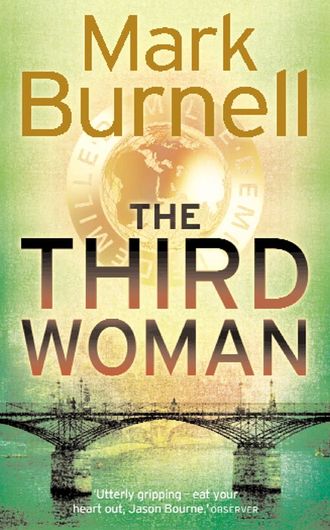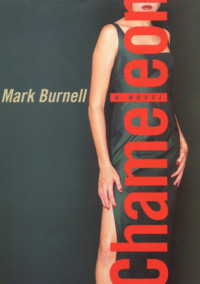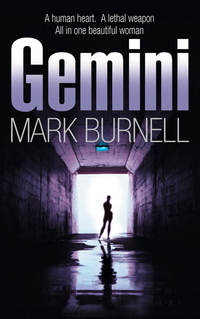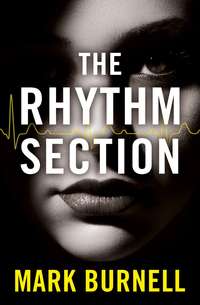
Полная версия
The Third Woman
I push through the large glass door and head down the short hall towards the exit, catching a glimpse of the reception area to my right; two men are arguing with the woman behind the desk. One of them is showing her something. A card of some sort. She’s speaking into the phone, clearly anxious. Beside her, a man sorts through a collection of keys.
I step onto rue de Berri. To my left, a flustered doorman in a long overcoat is standing by a black Renault. There’s no one in it. Both front doors are open, the front left wheel has mounted the kerb. A blue lamp sits on the dashboard.
Whatever you do, don’t run.
I venture right. I’m a stylish businesswoman carrying an attaché case. In this part of town, that shouldn’t raise an eyebrow. Except my own; above the noise of the city, the sirens are getting louder. Ahead of me, at the junction with Champs Élysées I see the first signs of stroboscopic blue light ricocheting off buildings.
I look over my shoulder. The doorman turns round. We’re fifteen metres apart. He can’t decide whether he’s seen me before. Someone cries out from the hotel. I feel like a rabbit stranded in headlights. Where is Petra?
Next to the Lancaster is the Berri-Washington twenty-four-hour public car-park, a blue neon sign above a long, sloping concrete ramp. My right hand is inside the black leather bag, my fingertips touching the Sigma. The first patrol car enters rue de Berri. There’s another behind it. And I’m going down the ramp.
A subterranean car-park should have a fire-exit that rises somewhere else. I try to ignore the sirens but I’m expecting the shout. The order to halt, to remove my hand from the bag, to drop everything and turn round.
I’m halfway down the ramp when a car comes into view. The engine echoes off the concrete as it rises towards me. A silver Audi A6 Quattro.
Keep calm.
I’m just a woman going to collect her car. I move to one side to allow the Audi to pass. But it slows down …
Keep going.
… and then halts.
Please, no.
My right hand searches for the grip. A window lowers.
‘Small world.’
For a moment I’m too dazed to say anything. It’s Robert Newman.
Behind me, and above us, there are more sirens. Decision time. What if there is no other way out?
‘Need a ride?’
This can’t be right.
But I smile sweetly anyway. ‘Sure. Thanks.’
I climb into the back of the Audi, which is not what he’s expecting. He looks over his shoulder and says, ‘You can sit up front if you like. I promise I won’t …’
Which is when he sees the gun.
‘Drive.’
‘What the …’
‘Trust me – you don’t have time to think about it.’
He glances up the ramp.
I thrust the tip of the Sigma into his cheek and yell: ‘Drive!’
He accelerates towards street level.
‘Where to?’
‘Right. Go right.’
‘I can’t.’
‘What?’
‘It’s one-way.’
‘Then go left!’
‘And after that?’
‘Just do it! And whatever happens, don’t stop. If you do, I swear I’ll kill you.’
We reach the ramp. He pulls out, past the black Renault, past two police cars, blue lights aflame. Officers hover on the street, a crowd gathers. I keep the gun out of sight. A young officer, eager to get us out of the way, waves us past. I peer through the rear window as the Lancaster recedes. At boulevard Haussmann we turn right.
How did they get there so quickly? Yesterday at Passage du Caire, it was the same; uniformed police officers only moments away. I close my eyes. When I open them, I see him in the rear-view mirror.
‘Where are we going?’ he asks.
‘Nowhere. Just keep moving. And don’t do anything stupid.’
‘Looks like I already have.’
‘Pull over.’
It was a quiet street off place de la porte de Champerret, just inside the périphérique. When Newman switched off the engine they could hear the rumble from the ring road. Almost an hour had passed, most of it in silence. Stephanie had tried to think but had found she couldn’t. There were too many competing questions. She couldn’t separate one from another, couldn’t focus on a single coherent thought. Gradually, however, Petra had emerged and cold clarity had replaced panic.
‘Put your hands on the steering wheel where I can see them. Don’t take them off.’
The street was empty. She tightened her grip on the gun and shifted her position so that she had a less awkward angle.
‘Okay. Who are you?’
‘You know who I am. Robert Newman.’
‘Believe me, your next cute answer’s going to be your last.’
‘I don’t know what else to say.’
‘Well you better think of something. And quick.’
‘My name’s Robert Newman. I’m a businessman.’
‘We meet at the bar then you’re driving up the ramp. Explain that.’
He shrugged. ‘I can’t.’
‘Coincidence?’
‘I guess.’
‘I don’t believe in coincidence. You and Scheherazade Zahani – that must have been the quickest date in history.’
Newman flinched at the mention of her name. ‘I wasn’t there to meet her. She just showed up. She was meeting a friend who’s staying at the Lancaster.’
‘Another coincidence?’
He couldn’t bring himself to acknowledge it. Stephanie leaned forward and pressed the tip of the Smith & Wesson into the back of his neck, just above the collar.
She said, ‘Let me explain something to you. Whoever you thought I was at the bar – she doesn’t exist. She never did.’
‘Look, I was due to meet someone. He called to cancel right after you left.’
‘I’m going to give you one more chance.’
‘See for yourself,’ he snapped, reaching inside his jacket.
‘Stop!’
Newman froze. And then clamped his right hand back on the wheel. ‘Jesus Christ! Take it easy!’
‘What did I tell you?’
‘I know what you said. I was just going for my cell phone. So you could see. The number, the time.’
Stephanie focused on her breathing for a second. Anything to slow the pulse. A couple were walking towards them, arm in arm, heads shrouded in frozen breath, hard heels clicking on the pavement. Stephanie placed the gun in her lap and shielded it with the black leather bag.
‘I need to disappear,’ she said.
‘Don’t let me stop you.’
‘Where do you live?’
‘Île Saint-Louis.’
‘Alone?’
He hesitated. ‘Yeah.’
‘I’m going to ask that again. If we get there and there’s someone to meet us I’m going to kill them, no questions asked. So think before you speak. Do you live alone?’
‘Yes.’
The couple strolled past the car.
‘Give me your wallet.’
‘It’s in my jacket. Like my phone.’
Stephanie pressed the Smith & Wesson to the same patch of skin. ‘Then be very careful.’
He retrieved it – Dunhill, black leather with gold corners – and passed it back. On his Platinum Amex the name read Robert R. Newman. He had two printed cards, one professional, one personal, which included an address on quai d’Orléans, Île Saint-Louis. The other card carried a name she didn’t recognize with an address at La Défense.
‘What’s Solaris?’
‘A company. I work for them.’
‘An oil company?’
‘Sometimes.’
‘We’re going to your place. I need somewhere to think.’
Quai d’Orléans, Île Saint-Louis, half-past-ten. They found a space close to his building. People passed by, heading home from the restaurants along rue Saint-Louis en Île.
Inside the Audi, Stephanie spoke softly. ‘I don’t want to have to do it. But if you make me, I will. Understand?’
Newman nodded.
‘If we meet anybody you know, play it straight. I’m just a date.’
They got out. Newman carried Leonid Golitsyn’s attaché case and she clutched the Smith & Wesson which was in the pocket of her overcoat.
They reached the entrance to the building. He pressed the four-digit code – 2071 – and they stepped into a large hall, sparsely furnished. They took the cage-lift to the fifth floor. The entrance to Newman’s apartment was a tall set of double-doors that opened into a hall with a smooth limestone floor. On the walls were gilt-framed canvases; flat Flemish landscapes beneath brooding pewter skies, moody portraits of prosperous traders, pale aristocratic women. There were Casablanca lilies in a tall, tapering, octagonal vase, their scent filling the hall.
Stephanie glanced at the flowers, then at Newman who understood. ‘Yvette,’ he said. ‘She looks after the place. She’s not a live-in. She comes daily during the week.’
‘Does she have her own key?’
‘Yes.’
‘If you like her, remind me to get you to call her in the morning.’
At gun-point Newman led her through the apartment; two bedrooms, each with its own bathroom, a large sitting-room, a modest dining-room, a generous kitchen, a utility room and a study. The sitting-room and dining-room were at the front of the apartment, French windows opening on to a balcony that offered a truly spectacular view of Notre Dame on Île de la Cité.
‘Nice place. Business must be good.’
They returned to the utility room. Stephanie made him open both cupboards; vacuum-cleaner, ironing board, a mop in a bucket, brooms, brushes, rags and cloths, cleaning products. She grabbed the coiled washing line from the worktop. On a shelf was a wooden box with household tools, including a roll of black tape, which she also took. Back in the sitting-room, she drew the curtains and dragged a chair to the centre of the floor.
‘Take off your jacket and tie.’
He did, unfastening the top two buttons of his shirt and rolling up his sleeves.
‘What happened to your wrists?’
Around each of them was a bracelet of livid purple scar tissue. She hadn’t noticed them before. He didn’t answer, glaring at her instead, his silence heavy with contempt.
‘Do what I say and I won’t hurt you. Now sit down.’
She bound his wrists with the washing line, securing them behind the back of the chair. Then she taped one ankle to a chair-leg.
‘Don’t make any noise.’
She left him and returned to the kitchen. It was a bachelor’s kitchen, no question: a central island with a slate top; two chopping boards of seasoned wood, both barely scratched; a knife-block containing a set of pristine Sabatier blades. In the fridge were two bottles of Veuve Clicquot, some San Pellegrino, a bottle of Montagny, ground coffee and orange juice. No food.
His suits were hanging in a wardrobe in the bedroom, all tailored. But in another cupboard another Robert Newman existed; denim jeans, scuffed and frayed, T-shirts that had lost their shape and colour, exercise clothing, old trainers.
On the bedside table was a Bang & Olufsen phone, a bottle of Nurofen and a copy of What Went Wrong? by Bernard Lewis. On the other table was a single gold earring. Stephanie picked it up. It curled like a small shell.
In the bathroom, Newman’s things were fanned out across more limestone. But in the cupboard behind the mirror Stephanie found eye-liner and a small bottle of Chanel No.5, half-empty. In the second bedroom, further evidence; a plum silk dress on a hanger, a couple of jerseys, a pair of black Calvin Klein jeans, some flimsy underwear, two shirts, a pair of silver Prada trainers.
She returned to the sitting-room. ‘Who’s the woman?’
‘What woman?’
‘The woman who leaves Chanel No.5 in your bathroom.’ She showed him the earring. ‘This woman.’
‘That could be mine.’
‘Trust me, I’m not in the mood.’
‘It’s none of your goddamn business.’
‘Sure about that?’
‘She’s history.’
‘If she shows up here, she will be.’
‘It’s been over for a while.’
‘It was on your bedside table.’
‘I’m the sentimental type.’
‘Her stuff is still here.’
She saw that he was extremely nervous – the sweat, the shivers – but he was determined to maintain the façade. The pretence was all he had to cling to. ‘You should see what I left at her place.’
There was no answer to that; Stephanie had left pieces of herself everywhere.
There was a large Loewe widescreen TV in the corner of the sitting-room. Stephanie sat on a sofa arm and flicked through channels; France 3, Canal+, France 2, pausing during a news bulletin on TF1. Continued analysis of the bomb in Sentier, riots in Caracas, an oil spill off the coast of Normandy. Then they were watching a female journalist with a red scarf around her throat. She was in rue de Berri, the Lancaster just discernible in the background, beyond the entrance to the Berri-Washington car-park.
The studio anchor was asking a question. The reporter nodded then said, ‘The police will say only that Russian art-dealer Leonid Golitsyn and another unidentified man have been shot dead in what looks like a planned execution.’
‘Have they suggested who might be responsible?’
‘Not yet. All we know is that their bodies were discovered by a member of the hotel staff and that …’
Not true. By the time she’d left Golitsyn’s suite, the police had arrived downstairs. She’d seen plain-clothed detectives at the front desk just seconds after stepping out of the lift. Yet seconds before, on the fourth floor, she’d exchanged a cordial bonsoir with the woman from Housekeeping.
Newman said, ‘No wonder I couldn’t guess what you do.’
‘I didn’t kill them.’
‘This guy Golitsyn – when you thought I was someone else, you thought I worked for him.’
‘When I got to the room, they were already dead.’
She couldn’t believe how guilty she sounded.
Newman stared at the Smith & Wesson. ‘That right?’
‘It hasn’t been fired. It’s not mine. I picked it off the floor.’
‘What are you saying – it was a suicide pact?’
She changed channels, choosing CNN’s coverage of the Sentier bomb. There was footage of the wreckage in Passage du Caire, a reprise of the casualty statistics and still no mention of Anders Brand.
In the CNN studio two experts sat beside Becky Anderson. One was a spokesman for Le Conseil Représentatif des Institutions Juives de France (CRIF), the other was a terrorism expert from the London School of Economics. The CRIF spokesman insisted the bomb was part of a growing campaign of anti-Semitic activity in France and went on to castigate the government and – by implication – the public for their lack of outrage.
The LSE analyst focused on the likely provenance of the two fake suspects. Snippets of information were threaded through the theory to lend it credibility; prescient rumours in recent days from sources at Le Blanc-Mesnil, a small town on the northern fringe of Paris with a largely immigrant population, formerly of Sephardic Jews from the north-African colonies, more recently of Muslims, many from the same countries.
The premise sounded convincing; racial hatred boiling over in an area known for it. Le Blanc-Mesnil fell under the scope of District 93, also known as the Red belt from an era when it was controlled by staunchly Communist mayors. Immigrants had always been a pressing problem. The man from the LSE managed deftly to link ill-feeling in Le Blanc-Mesnil to Jewish commercial interests in Sentier. Stephanie was almost persuaded by him until he mentioned the suspects again.
She turned off the television.
Two incidents in one city on consecutive days. Superficially independent of one another but linked by a third incident: the murder of Jacob and Miriam Furst. Not in itself significant enough to make the news – an old couple murdered in their home – but vital to Stephanie because she was the single factor common to all three.
Day Four
She woke with a start and checked her watch. Three-twenty-five. As a teenager, she’d been a hopeless sleeper. As Stephanie, she still was. But Petra had been trained to take sleep wherever she could, no matter how hostile the environment.
They were in the sitting-room. Newman was slumped in his chair, his head lolling to one side. Stephanie was on the sofa behind him. She’d chosen it deliberately for the small psychological advantage of being invisible to him.
Silently, she rose from the sofa and went to the bathroom. She showered then wrapped herself in one of his towels and sorted through his ex-lover’s wardrobe. The black jeans were the right length but Stephanie’s waist was slimmer. She pulled on a navy long-sleeved T-shirt, a chunky black jersey and the silver trainers.
She felt human again. As human as Petra could be.
In the kitchen she filled a kettle. While the water heated she investigated Newman’s study. On a large oak desk beside the window were two slim Sony monitors and a cordless keyboard. She looked in the drawers; stationery, bills and receipts, correspondence, cash – euros, dollars, Swiss francs – an Air France first-class boarding card from Singapore to Paris, and two American passports.
The first passport belonged to Robert Ridley Newman, aged forty-eight. It had been issued two years before but there were already dozens of stamps in it, some recurring frequently; Damascus, Riyadh, Beijing and Shanghai, Tehran, Jakarta. The second passport was seven years older. She flicked through the pages. There were only twelve stamps in it, nine of them issued at Ben-Gurion airport, Tel Aviv.
In the bottom drawer on the right she found a Vacheron watch with a leather strap. On the back was an inscription and a date: Robert, with love, Carlotta, 10–11–2001. A birthday? She checked the passports. Not his.
Back in the kitchen, she switched on the TV suspended over the slate worktop. Bloomberg was playing. She flicked through the channels until she came to BBC World, which was showing archive footage of Anders Brand. He was shaking hands with Kofi Annan, Bill Clinton to one side, the three of them sharing a joke. At the bottom of the screen the caption read: Former Swedish diplomat named among Paris dead.
A résumé unfolded; posts in Manila, Baghdad, Rome and Washington, as a junior diplomat, followed by two forays into business with Deutsche Bank in New York and Shell in London. Later, Brand had returned to the Swedish diplomatic service, serving in the Philippines, then Spain. After that, he’d joined the United Nations in New York, filling a series of increasingly undefined roles as his star rose. Divorced for almost twenty years, Brand was survived by his ex-wife, the former actress Lena Meslin, and their two adult sons.
A little late but just as Stern had predicted.
Stern.
Painfully, Stephanie surrendered to the one thought she’d been resisting since the Lancaster.
You set me up.
Now, more than ever, she needed information. For years, he’d been her preferred source. Information from Stern was bought at a premium but was cheap at the price. She’d never had reason to question its quality. He’d never sold her out. On the contrary. There had been occasions where he’d volunteered information to protect her. Or rather, as he usually put it, to protect his investment.
Safe from one another, their relationship had evolved into a form of sterile, electronic friendship, neither of them interested in finding out too much about the other because they both understood that security lay in anonymity. But in the beginning it had been strictly business; request, negotiation, payment, delivery. Cold and clinical.
Stern traded information, not affection. The faux relationship that Stephanie had allowed to develop between them had come to obfuscate that uneasy fact. Stern owed her nothing, nor she him. At the end of every transaction they were equal. It was true that he’d made money out of her. Just as she’d made money out of the information he’d sold her. She’d come to assume that he’d never trade her because she was valuable to him. But why not, if the money was right? She’d never guaranteed him anything. Each transaction ran the risk of being the last. Stern existed in a transitory environment; the currency of information tended to devalue with time. In both their worlds, it paid to seize the moment.
Ultimately, Stern’s fidelity was always going to be a question of price.
At first, he thought he’d imagined it. The sound of running water. A shower. His shower. He tried to straighten himself. Had he fallen asleep? Perhaps, but not in the regenerative sense. Sleep was nothing more than a brief lapse between uncomfortable bouts of waking. He was slowly seizing; numb hands, stiff neck, sore spine, cramping muscles. His mouth felt dirty and dry.
He wondered how long he’d been alone. Not that it mattered. There was nothing he could do. He and the chair had become a single entity, she’d made sure of that. An entity isolated at the centre of a Bokhara carpet, a castaway in his own apartment.
He couldn’t reconcile the woman in his apartment with the woman who’d approached him at the bar in the Lancaster. Claudia Calderon had been confident, relaxed, playful. And sexy. He could admit that, even now. And then there was the creature with the gun. What had she done? What did she want?
He tried to convince himself that she wouldn’t harm him. That she’d float away, like a bout of bad weather, leaving him as she’d found him. But Leonid Golitsyn and another man were dead. Newman had seen that on TV. She’d admitted to being in their room. And she had the gun. He’d barely heard her denial. Stranger still, she’d seemed more preoccupied with coverage of the Sentier bomb than events at the Lancaster. Were the two connected? Was she the connection? And if she was, what would that mean for him?
Stephanie said, ‘I’m going to untie your hands. You need to get your blood moving.’
The purple scars around the wrists were shiny and ragged. There was no smoothness to them, nothing … uniform. The hands themselves were swollen. As they separated a shudder coursed through Newman. He brought his arms to the front of his body in a series of stiff jerks, catching his breath with each halt. Once his hands were in his lap he flexed his fingers. She saw the solid tension in his shoulders, knotted muscle crawling on itself.
‘Who’s Carlotta?’
He didn’t answer.
‘I usually like to know whose clothes I’m wearing.’
Still nothing.
‘Was the earring hers?’
She could see no fear, no anger, no emotion at all.
She left him and took Golitsyn’s attaché case to the sofa. Keys, pens, a leather-bound address book, lots of business documents. His letters were addressed to him at several locations: the head office of MosProm on ulitsa Tverskaya in central Moscow; Galerie Golitsyn on avenue Matignon, Paris; the Hotel Meurice, Paris; an apartment on East 62nd Street in New York City.
In a see-through foolscap plastic wallet was a set of architectural plans. Stephanie turned it over to see the address. Cork Street, London; another art gallery, she assumed. There was something inserted between the folds of the drawings. She unzipped the wallet and a sheet of paper slipped free.
It was an agreement with an immobilier named Guy Grangé on boulevard Magenta in the 10ème arrondissement. A one-month rental, a one-room apartment in the Stalingrad district, cash paid in advance. Not the sort of area Stephanie would have expected Golitsyn to frequent. Or the sort of property, for that matter. There was no address, just a reference number. The printed key code corresponded to the number on the red plastic disk attached to the keys.





